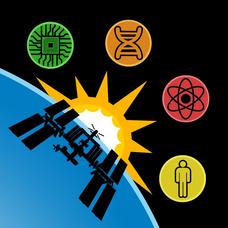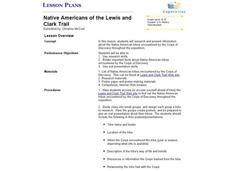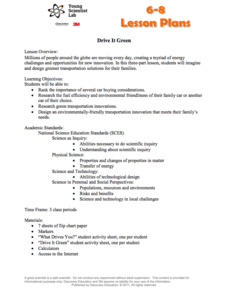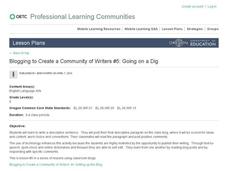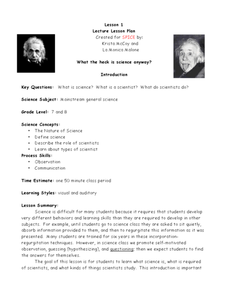NASA
Space Station Research Explorer
Take a trip into outer space from the safety of your classroom. A great addition to the digital library of any science teacher, this reference offers a behind-the-scenes look at the research going at the International...
NOAA
Build Your Own Ocean Ecosystem
Hold the sea in the palm of your hand! Amateur oceanographers work together to create models of an ocean ecosystem in the sixth and final installment in a series. Raise awareness of global ocean health issues through guided research,...
Curated OER
The Story of the Solar System
There is more to the solar system than the typical study of the sun and planets. Launch a study of asteroids, meteoroids, and comets by watching the video The Story of the Solar System, available for purchase through this...
Curated OER
Christopher Columbus
Help first graders gain an understanding of the beginnings of our nation by learning more about Christopher Columbus. They begin by listening to a read aloud of Christopher Columbus and His Voyage to the New World (another title...
Curated OER
The Extraverted Thinking Personality Type: An Introduction
Curriculum strategies designed to engage and inspire a predominantly extraverted thinking class.
Curated OER
The Extraverted Sensing Personality Type: An Introduction
Curriculum approaches and techniques that tantalize extraverted sensors.
Desert Discovery
Leaping Lizards
Here is a fine biology lesson that introduces youngsters to reptiles. They study their feeding habits, their habitats, and the adaptations they must make to survive in their environments. The outstanding lesson includes two excellent...
Virginia Department of Education
Current Applications in Science
High schoolers may claim to have no interest in scientific revelations and discoveries, but watch how quickly they download a new app onto their state-of-the-art smartphones. Scholars discuss the scientific or technological...
Edgate
Native Americans of the Lewis and Clark Trail
As part of a study of the Corps of Discovery expedition, class groups research the different Native American tribes Lewis and Clark encountered on their journey and share their findings with the class.
University of Colorado
Astro-Chronology
Class members play a version of the game Chronology to determine when certain scientific events occurred in history. Teams play until someone has 5-10 events in the correct order.
Discovery Education
Drive it Green
Explore and brainstorm innovations for cars with a STEM lesson that asks scholars to weigh different options when considering when buying a car. They research the fuel efficiency and carbon emissions for various options, and then...
National Geographic
Ocean Exploration
Dora, Dora, Dora, Dora, Dora! This may be your little ones' best guess as to what it's like to be an explorer! Give them a deeper understanding with this compact examination. A four-minute video introduces them to Robert Ballard,...
Curated OER
Blogging To Create A Community of Writers # 5 of 7
Here is lesson 5 from a 7 lesson unit on using blogging to create a community of writers. The aim of this lesson is to get students writing about what Archaeologists do and how they use material data to study the past. They compose a...
Curated OER
Commemorating Women's History
Lesson and project ideas to celebrate Women's History Month.
Curated OER
What They Left Behind: Early Multi-National Influences in the United States
Students research the impact of European voyages of discovery and colonial influence on different aspects of American culture. They access a number of online sources and reference maps to trace the influences of England, France, Holland,...
Discovery Education
Cushion It!
Sugar cubes, collide! Groups design protection systems using bubble wrap to protect sugar cubes from being destroyed by falling batteries in the STEM lesson. They consider how the experiment relates to collisions in real-world...
Judicial Learning Center
Getting Ready for Trial
A courtroom can be a scary place for the uninitiated. Get familiar with the process using a helpful overview of the activities that take place prior to both civil and criminal cases. The lesson explains the differences between...
Curated OER
Where's Dinner?
Upcoming marine biologists consider a list of organisms residing near the Lost City hydrothermal vents and construct a food web. They compare the food web to that of a cold seep community, of which they should have previous knowledge....
Curated OER
What the Heck Is Science Anyway?
Here is a 12-page outline of an introductory science lesson. The teacher lectures on what science is, the role of a scientists, different disciplines of science, and the impact of scientific discoveries. Detailed lecture notes are...
Curated OER
Reading Strategies: Main Idea
Identify the main idea and the supporting details of a story in a literacy resource from Discovery Education. Complete with procedures, vocabulary, and assessment activities, this is a great way for pupils to practice their outlining...
Curated OER
Adding and Subtracting Decimals With Excel
What a great way to have pupils apply classroom learning to real-world skills! They complete problems involving the addition and subtraction of decimals related to banking-type questions, and then use a spreadsheet to display their results.
Curated OER
Measurement: Finding Areas of Rectangles
Gardening geometers construct the formula for the area of a rectangle by viewing a video revolving around two young people, their lawn mowing business, and their need to charge by the square meter. A relevant real-life application lesson!
Teach Engineering
Adapatations for Bird Flight - Inspiration for Aeronautical Engineering
It's a bird, it's a ... device made to mimic birds. The eighth installment of a nine-part module has pupils read various articles to learn about bird flight. They consider the implications for aeronautical engineering.
Curated OER
Animal and Plant Cell Journaling Activity
Jump into the classification of animal and plants cells, through this inviting lesson comparing Elodea leaves and Epithelial cells. Middle school learners will create wet mounts, write journal entries that compare specimens, and finally...
